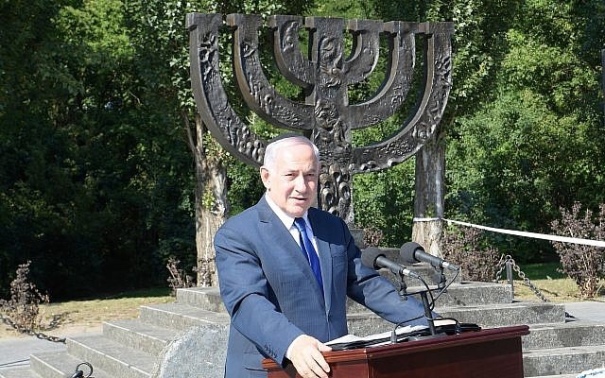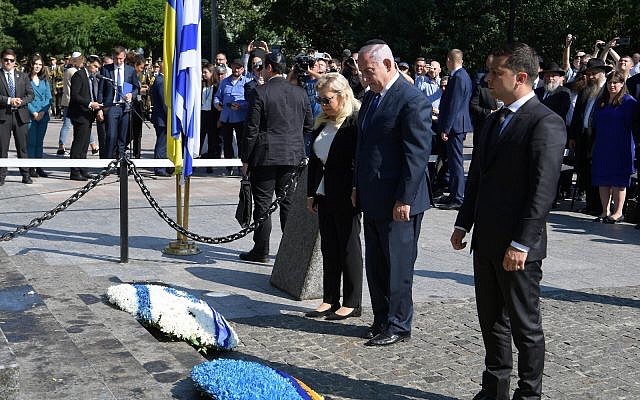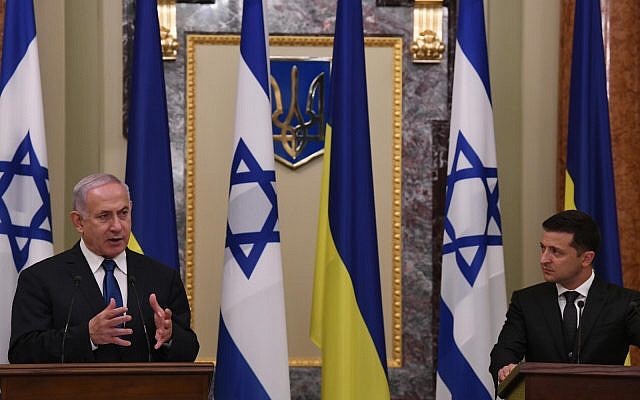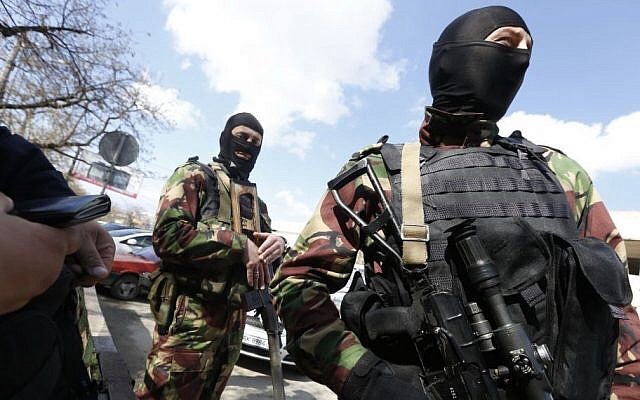
Netanyahu hints Israel behind strikes on Iraq, says Iran not immune anywhere
Babi Yar is for Jews an ‘eternal imperative,’ Netanyahu says at Holocaust mass killing site in Kyiv; refuses to condemn Russia’s 2014 annexation of Crimea
By Raphael Ahren Today, 1:55 am
KYIV, Ukraine — Prime Minister Benjamin Netanyahu on Monday hinted that Israel was behind recent airstrikes on Iranian targets in Iraq, stressing that the Jewish state will continue to act militarily whenever and wherever there is a need to do so.
“Iran has no immunity, anywhere,” he told reporters during a briefing in his Kyiv hotel, responding to a question about various recent attacks on military installations in Iraq, which are attributed to Israel.
The Iranians continue to threaten Israel with annihilation and are building military bases across the Middle East intended to carry out that goal, Netanyahu said, blaming the 2015 nuclear deal for Iran’s increasing aggression. “We will act — and currently are acting — against them, wherever it is necessary,” he declared.
Last week, a former Iraqi deputy prime minister indicated Israel was responsible for a massive explosion in a weapons depot controlled by an Iranian-backed Shiite militia in Baghdad.
“We believe they are weapons we were holding onto for a neighboring state and they were targeted by an oppressive colonial state on the basis of a treasonous Iraqi act,” former deputy prime minister Baha al-Araji wrote on Twitter.
According to foreign reports, Israel has been increasingly active in carrying out airstrikes against Iran-backed militias in Iraq, shifting its focus after years of reported raids aimed at keeping Tehran from gaining a foothold in Syria.
Israeli officials have identified Iraq as a likely growing base of operations for Iran-backed efforts against the Jewish state. But Israeli officials have so far neither confirmed nor denied responsibility for the strikes.
Earlier on Monday, Netanyahu indirectly addressed Iran’s threats against Israel at a speech at Babi Yar, the Kyiv ravine where the Nazis committed one of their deadliest shooting massacres.
“In this grave, the mass grave here behind me, tens of thousands of Ukrainian Jews and many non-Jews were murdered… I say in a clear voice, precisely in this place, that it is our constant duty to stand against murderous ideologies in order to ensure that there will never be another Babi Yar,” he declared.
At Babi Yar, the Nazis and their local collaborators shot more than 33,000 Jews in September 29-30, 1941. Tens of thousands of non-Jews were killed at the ravine as well.
“For humanity, Babi Yar is a warning sign. For Jews, Babi Yar is an eternal imperative. We will always defend ourselves by ourselves against any enemy,” Netanyahu said, speaking in Hebrew.

PM Netanyahu, his wife Sara and Ukrainian President Zelensky lay wreaths at a monument for Jewish victims killed at Babi Yar in Kyiv, Ukraine, August 19, 2019 (Amos Ben-Gershom (GPO)
Ukrainian President Volodymyr Zelensky also attended the event, describing the mass killings the Nazis and their local collaborators carried out there as “impossible to understand, impossible to forget and impossible to forgive.”
There are two monuments at Babi Yar, one usually visited by foreign dignitaries that commemorates all victims of Nazism who were killed at the site, and another, built specifically to commemorate the Jews killed at the site.
Zelensky is believed to be the first Ukrainian head of state to accompany an Israeli dignitary to the second site, marked by a giant menorah.
In his speech, he highlighted the fact that Ukraine is the country with the fourth-highest number of Righteous Among the Nations, who risked their lives to save Jews during the Holocaust.
“The memory of the victims should serve as a warning that the ideology of intolerance and violence takes away the most precious and valuable — human life,” Zelensky, who is Jewish, said. “Today, in Babi Yar, we call on the international community to unite efforts to prevent any manifestation of anti-Semitism and intolerance on racial or national grounds.”
During Monday’s press briefing, Netanyahu also refused to condemn Russia’s 2014 annexation of Crimea or to explicitly back Ukraine’s claim to the peninsula.
During his meeting with Zelensky earlier during the day, the Ukrainian president thanked Israel for its “continued support of Ukraine’s territorial integrity and for an unwavering stand on the war in the east of our country and the annexation of Crimea.”

PM Netanyahu, left, and Ukrainian President Zelensky address the press at the presidential residence in Kyiv, Ukraine, August 19, 2019 (Amos Ben-Gershom (GPO)
But, in fact, official Israel never formally expressed support for Kyiv’s position on its ongoing conflict with Russia, but rather stayed neutral.
Jerusalem has attempted to massage ties with Russia, which is a major player in Syria, where Israel has acted militarily to keep Iran from gaining a foothold.
In 2014, the Foreign Ministry in Jerusalem issued a toothless statement expressing the hope the the matter “will be handled through diplomatic means and will be resolved peacefully.”
Israel has remained neutral in the Russian-Ukrainian conflict, refusing to explicitly condemn Russia’s annexation of Crimea in 2014. At the time, the Foreign Ministry in Jerusalem issued a toothless statement expressing the hope the the matter “will be handled through diplomatic means and will be resolved peacefully.”
Israel in March 2014 also abstained on a United Nations General Assembly resolution condemning Ukraine’s “partial or total disruption of the national unity and territorial integrity of Ukraine, including any attempts to modify Ukraine’s borders through the threat or use of force or other unlawful means.”

Russian soldiers guard the center of Simferopol, Crimea, March 27, 2014. (AP/Max Vetrov/File)
The US-sponsored resolution passed with 100-11, with 58 abstentions.
“I have nothing to add to what was done at the time,” Netanyahu told The Times of Israel Monday.
The prime minister also refused to say whether Zelensky asked him to mediate between him and Russian President Vladimir Putin.
“For anyone to become a mediator, you need three parties — Russia, Ukraine and the mediator,” the prime minister says. “It takes three to tango. And I don’t think we have the three at this point.” He declined to answer a follow-up question whether Zelensky asked him to play mediator rule in the future.
Times of Israel staff contributed to this report.
No comments:
Post a Comment